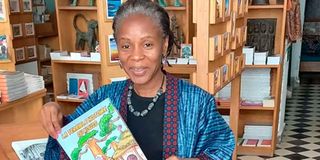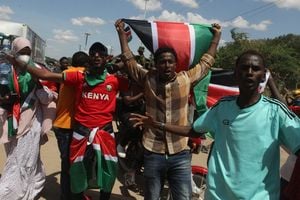I am unapologetically feminist, Coumba Toure

Coumba Toure displays one of the books she has authored. She says she was called a feminist before she understood what it meant.
What you need to know:
- Coumba Toure was born in Segou in south Central Mali, five decades ago.
- Up until end of 2022, Ms Toure was the co-coordinator of Africans Rising.
- She says feminism means telling governments that tweeting about football or something in Europe, but not of women dying is not okay.
In every meeting, Coumba Toure’s dressing stands out. She is known to adorn brightly coloured Boubou outfits with intricate patterns complete with an equally radiant smile.
She admits that fashion is a big part of her activism and during her last visit to Kenya, she brought a bag full of clothes from Dakar to share with her friends.
When she speaks, her calm, soft but commanding voice draws the attention of her audience. It is no surprise because Ms Toure has amassed years of experience in public speaking. Also an author, publisher and story teller, she writes in Bambara (spoken in Mali and Senegal), Wolof (spoken in Senegal, the Gambia, and Mauritania), French and more recently English.
Listed as one of 100 Most Influential African Women in 2019, she is a renowned leader in the civil society sector, and a feminist.
"I was called a feminist before I understood what it meant. Women tend to justify why they are feminists. For me, there are no ifs or buts, I am unapologetically feminist,” she says.
She was born in Segou in south Central Mali, five decades ago. Afterwards, she moved to Dakar in Senegal with her family. Her parents, both civil servants of average affluence, strived to give her quality education which saw her write her first novel before age 17. These opportunities also exposed her to like-minded feminists like Ayesha Imam, Fatou Sow and others who helped her put herself, belief and work in a larger framework.
Up until end of 2022, Ms Toure was the co-coordinator of Africans Rising. The Pan-African movement was founded in 2017 to erase borders in the continent and unite Africans across the globe, and to call for the liberation and reparations for Africa.
She speaks to Nation.Africa about feminism, gender-based violence and life beyond the movement.
What does feminism mean to you?
Feminism is a practice and an ideology that is extremely simple. It is about challenging power dynamics. Socially, some people have powers that allow them to have privilege which many times, they use against others. And patriarchy might be one of the strongest powers around the world. Because it does not matter where you go, there is power that is given or deferred to those who are considered as male. Feminism looks at power relationships and how to change or to balance them to make sure people have equal opportunities, equal voices, are protected the same ways and so on. Power is also given based on race. In some of these spaces, when you are black man or woman, you might not be trusted the same way. And so, it is not even about the binaries of men and women, but about power dynamics that my feminism lies.
Did your upbringing in any way contribute to your feminist ideology?
My father was political maybe Pan-Africanist but definitely not feminist. Still, he played a key role in developing my critical thinking skills. He taught me how to question and that I did in all aspects of life. Whenever anyone would say women cannot do this and that, I would ask why not?
My mother was also a very critical thinker and even though she did not speak of her love of women or black people in general, I saw how she supported the neighbours and people around us. And how she used the little power she had to act on things to make a difference. So I think I picked things from them that I continue to apply in my life.
We recently concluded the16 Days of Activism against GBV, what role does feminism in Africa play to address the vice?
Gender-based violence, particularly against women in Senegal, is similar to that in Kenya and everywhere else in the continent. Just recently, I organised a sitting because for three days in a row, a woman was killed. Before then, there was no uproar, no nothing, because femicide is normalised. And that is where we as feminists step in, to challenge our governments. To tell them that tweeting about football or something in Europe but not of women dying is not okay. And even as we brought this issue to light, we had to contend with accusations of giving the country a bad name when in truth women were being killed.
What then do you think needs can to be done?
To tackle GBV, there is need for serious investment of time, resources, learning and research not only from our governments but civil societies and education systems too. But then also, it is an issue we need to look at, at an individual level first. To question where you stand in this violence. How you contribute to it. As a man or a woman how do you talk to people who experience it? Are you reinforcing it and asking them to silence themselves or are you helping them bring it out and encouraging them to rise above? We also need a clear, favourable legal environment that allows people to speak, but also makes people fear to do certain things. Additionally, we need an empowering educational environment, which teaches people to speak up as well as safe spaces where people can air what they are going through, be they physical or virtual.
Should men care about feminism?
Yes, they should. The liberation of women is connected to that of men. Sexism for example, is a gender issue and it harms men as much as it does women, especially the category of men who do not fit the patriarchy model including poor and gay men.
Secondly, patriarchy also demands that men be strong and suppresses their ability to express themselves. Even when they want to speak, the words do not come so the anger stays in and it only presents in the fist. When referencing GBV, it prevents men from speaking up. So we all collectively need to dismantle the patriarchy.
Does feminism harm or disempower men?
Look at it this way, if we create a week or a month to say that African people need their liberation, is that taking away anything from white people? No. It is the same thing. When there is injustice, and we challenge people to look at that injustice for the oppressed, it does not take anything away from those benefiting from the oppression, except for of course, some privilege. When we say Africa needs to be liberated that has nothing to do with hating white people. It also has nothing to do with trying to demean them. It is about wanting to make decisions for ourselves. Of course, I think many white countries may not like losing the privilege of deciding for Africa. Likewise, men like the privilege of deciding for women but that does not take away the fact that women need to be free.
As you transition from the position of co-coordinator the movement, what’s next for Ms Toure?
Even though I will step back from leadership, I will remain in the movement as a member, an ambassador and spokesperson. Instead, I want to spend more time training and helping people understand these things that we are talking about. I also want to exert more effort in writing and publishing while building new spaces where people can join and be part of such movements.





